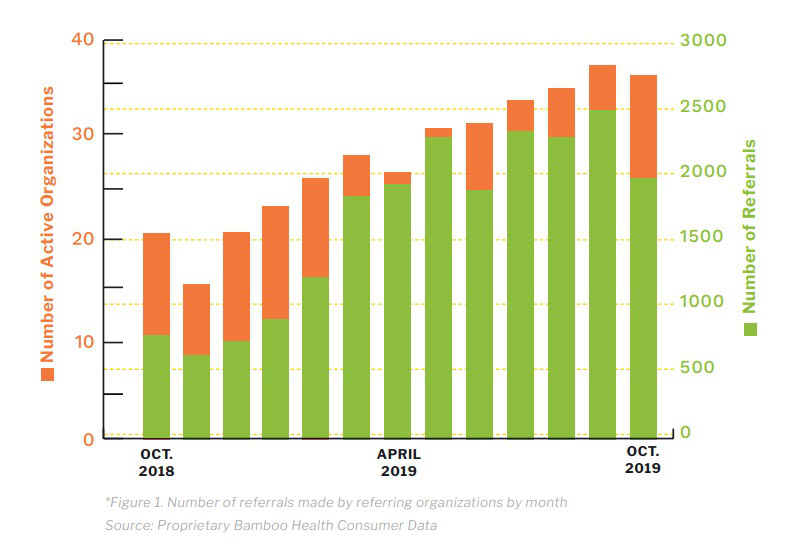The Challenge
Beginning in 2020, the COVID-19 pandemic exacerbated demand for mental health and substance use disorder (SUD) services, straining provider resources and contributing to a devastating spike in drug overdose deaths. This trend has continued with over 100,000 yearly overdose deaths in the years that followed.
50-60
million Americans experience mental health challenges each year.
Continued high demand for physical and behavioral healthcare resources have strained the nation’s healthcare system, including hospitals, health systems and behavioral health providers. More than two-thirds of mental health and substance use treatment organizations reported seeing an increased demand for services following the onset of the pandemic, and nearly half have seen their patient waitlists grow.
For hospitals and health systems, the pandemic heightened awareness of key long-standing issues, including the need to reduce emergency department (ED) overcrowding and decrease ED wait times by ensuring individuals are routed quickly to the most appropriate care. Mental health emergencies are a significant contributor to these challenges, as EDs too often serve as the entry point to care for individuals needing behavioral health services.
Approximately 21 million ED visits each year are associated with mental health and SUDs. Mental health emergencies comprise just 8.2% of all ED visits, but they take up 11.2% of ED hours.
Addressing the disproportionate amount of time spent on ED visits associated with rising rates of mental health and substance use issues is critical. Such action has the potential to positively impact public health, improve overall health outcomes and enhance the quality of the experience for everyone involved, including patients, providers, health systems and communities.

The Solution
OpenBeds offers solutions for states seeking to better support healthcare providers and communities and addresses common challenges such as ED overcrowding and long wait times due to inefficient referral processes. Through OpenBeds, states have the ability to create a wide network for collecting, analyzing and sharing actionable data. The cloud-based solution offers complementary clinician- and public-facing portals that connect providers and consumers to SUD and mental health treatment in ten states and counting.
OpenBeds facilitates rapid referrals and feedback by identifying and tracking mental health and SUD inpatient and outpatient treatment options in a single network.
OpenBeds Provides:
Decision support for providers and consumers, including detailed inclusion and exclusion criteria for specific services to ensure quality referrals to treatment
An inventory of outpatient and inpatient services, including available psychiatric, crisis, dual diagnosis, withdrawal management and residential treatment beds and wait times
A registry of social service resources available for direct or indirect referrals
Secure two-way provider communication for the digital exchange of necessary patient information, such as medical records and consent forms
Comprehensive data aggregation and analytics capabilities
OpenBeds helps to ensure that individuals in need of mental health and SUD services are not left waiting for extended periods as providers search for suitable referral care. Treatment Connection™—the public-facing portal for consumers—streamlines access to care for individuals searching for their next step in their care journeys. Using a straightforward, easy-to-use format, it provides individuals with critical information to help them connect more efficiently to the most appropriate and closest care available in their communities. By facilitating smooth transitions to effective care, OpenBeds ultimately helps improve the likelihood those patients will have better outcomes.
FOR PHYSICIANS, NURSES, AND OTHERS WORKING IN THE INTENSE AND DEMANDING ED ENVIRONMENT
OpenBeds offers the ability to see the longitudinal patient record and quickly identify the most appropriate resources to match the level of care best suited to that patient’s specific needs. Based on that criteria, providers are then able to efficiently connect and schedule patients for the closest available care through OpenBeds digital screening, intake and registration functions, which include the ability to coordinate prior authorization and peer support.
After patients are discharged from the ED, clinicians can close the loop on referrals to ensure individuals are connected to needed treatment. They can use OpenBeds to track whether providers have accepted or declined those referrals. If the referral is denied, they can see the reasons why. Lastly, they can see whether or not patients showed up for the recommended follow-up care or services.
FOR STATES
OpenBeds provides detailed data and analytics capabilities to help public health officials track key ED performance metrics. The solution’s analytics dashboard can be used to track real-time statewide user engagement, utilization, wait times from discharge to referral, and referral patterns. State agencies can track how efficiently EDs are handling referrals through OpenBeds date and time stamp functionality to determine whether individuals are being connected to treatment and services, and how quickly those connections are made. State officials also are able to identify trends in ED referral patterns to determine if and where there may be gaps in behavioral health resources. For example, they can identify if additional SUD services may be needed to serve rural communities where providers routinely have difficulty placing ED patients for treatment following overdoses.
OpenBeds is best utilized when there is extensive engagement among providers to ensure a robust network, with a full array of care options for patients and referring providers to choose from. Having active participation of hospitals and health systems is critical to the success of OpenBeds across the states where its solutions are deployed. ED staff typically are onboarded as referrers in OpenBeds. This enables them to access the full spectrum of behavioral health treatment options in the state to help secure quality referrals to the most appropriate level of care for individuals presenting at the ED with behavioral health needs.
FOR PROVIDERS
OpenBeds facilitates optimal access by streamlining care transitions and replacing time-consuming manual processes that often require providers to call, email or fax multiple facilities individually to find available resources for patients.
The Results
- Significantly shortened the amount of time patients have to wait for referrals
- Increased access to care by increasing the number of distinct services offered for patients by 173%
- Helps state partners to track key ED performance metrics
- Ultimately improves patient outcomes for those in need of mental health and SUD services
Implementation of OpenBeds can help states have a positive impact on the overall ED experience, including facilitating faster referrals to the most appropriate care.
For example, one state client’s extensive provider participation has contributed to a significant increase in treatment referrals and decreased wait times since the state implemented its solution. The state’s department of health launched OpenBeds in 2018 to expedite placement of patients in need of mental health and SUD services.
Prior to implementation, providers relied on a disjointed process for referring patients through phone, fax and email communications. ED staff often spent undue amounts of time calling around to various facilities to find available treatment options for patients, and some patients fell through the cracks as a result. Upon implementing OpenBeds, state officials led an aggressive engagement campaign to educate providers about the system, including how it worked and the numerous benefits of participating. More than 70 provider facilities statewide now actively participate as a result.
Within its first year, the state accommodated 20,924 treatment referrals, including 75% that involved inpatient services, and 57% voluntary and 43% non-voluntary referrals. The state has seen a 2.8% compound monthly growth rate in referrals through the network. Broad use of the system also has helped to significantly shorten the amount of time patients have to wait for referrals. Over the course of the first 12 months, the proportion of receiving organizations that acknowledged a referral within 30 minutes or less steadily increased to a high of 65%.
NUMBER OF REFERRALS MADE BY REFERRING ORGANIZATIONS BY MONTH*

This has contributed to expanded access for patients, with the number of distinct services offered among all active receiving organizations growing 173% within the first year alone. Through the system’s data and analytics capabilities, state health officials are able to track overall referral patterns and identify specific problem areas, including the most commonly abused substances and difficult-to-place medical conditions, such as patients with active psychoses, complex medical conditions, and developmental disabilities.
OpenBeds is helping officials and providers improve overall mental health and SUD services in the state, including streamlining referrals and shortening wait times by getting patients more quickly to the most appropriate levels of care. In addition, the system has helped the state’s department of health identify service gaps, effectively target funding, shape policy, evaluate program effectiveness and design and alleviate some of the treatment burden for clinical staff, social workers and other providers.
The Impact

OpenBeds helps states across the country enhance vital access to care for their communities. In the process, it is helping public health officials and providers address long-standing health system challenges that have been exacerbated by the COVID-19 pandemic, such as high demand for behavioral health services that contributes to ED overcrowding and long wait times for patients from discharge to referral.
OpenBeds current solution and new developments support states’ public health goals by expanding access, better tracking referral trends and addressing mental health needs before, during and after escalation. As our state customer’s results clearly illustrate, engaging hospitals and health systems statewide is key to success in maximizing the many potential benefits of OpenBeds. With broad provider participation, OpenBeds can improve access to much-needed treatment for individuals presenting with SUD or mental health needs, and ultimately help facilitate better outcomes for those individuals.



